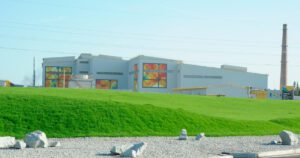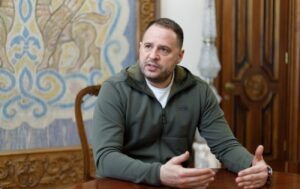
in January-September 2022, the international vertically integrated steel and pipe company Interpipe cut its capital investments by three times as against the similar period of the last year – to $15 mn from $45 mn.
According to a presentation of the company’s operations for the nine months of last year, capital investments in the period under review amounted to $7mn ($6mn in 9M2021), $8mn in steelmaking and $31mn in pipe production, while there were no investments in railroad operations ($8mn).
We would like to note that the figures for 9M-2022 are unaudited.
As we informed, in January-September 2022, Interpipe earned $185.952 mln, while during the same period last year it amounted to $32.338 mln (5.75 times more). The company made $199.975 mln of profit after tax, compared to $56.505 mln for the first nine months of 2021 (a 3.5 times increase). At the same time, revenues decreased by 9.3% to $686.634 mln. The company increased its free cash flow to $126.476 mln as of September 30, 2022, from $103.007 mln at the end of September 2021.
EBITDA at the end of September 2022 was $123.023 million ($51.508 million for the pipe segment, “minus” $3.287 million for the rail segment, $74.222 million for the steel segment, $580 thousand for other operations), compared to $150.876 million (“minus” $36.040 million, “plus” $15.351 million, $169.483 million and $2.082 million respectively at the end of 2021).
“Interpipe is a Ukrainian industrial company producing seamless pipes and railroad wheels. The company supplies its products to over 80 countries all over the world via a network of commercial offices located in the key markets of the CIS, the Middle East, North America, and Europe. In 2021, the company sold 602 thnd mt of tubes and 174 thnd mt of railroad products. The company sells its railroad products under the KLW brand.
There are about 10 thsd. employees in Interpipe.
The company consists of five industrial assets: “Interpipe Nizhnedneprovsky Tube Rolling Plant (NTZ)”, “Interpipe Novomoskovsk Tube Plant (NMTZ)”, “Interpipe Niko Tube”, “Interpipe Vtormet” and the electric steelmaking complex “Dneprosteel” under the brand name “Interpipe Steel”.
The ultimate owner of Interpipe Limited is Ukrainian businessman Viktor Pinchuk and his family members.

On Friday, 12 bulk carriers with corn, wheat, soybeans and sunflower meal left Ukrainian ports, the Joint Coordination Center (JCC) reports.
“On January 13, twelve vessels left Ukrainian ports, they are transporting a total of 346,356 tonnes of grain and other food within the framework of the Black Sea grain initiative,” the report says.
Two bulk carriers Cuma (70,799 tonnes of corn) and Georgia T (61,252 tonnes of sunflower meal) are heading to China, two vessels Solar (37,205 tonnes of wheat) and Bosphorus King (25,000 tonnes of corn) are heading to Italy. Two more bulk carriers Rio (8,500 tonnes of wheat) and Umit G (4,300 tonnes of wheat) headed for Greece.
The vessel Papua will deliver 29,300 tonnes of soybeans to the Netherlands, the vessel Cape Scott – 28,000 tonnes of corn to Portugal, the vessel New Faith – 26,500 tonnes of corn to Spain.
In addition, two vessels Garnet (33,000 tonnes of corn) and Muzaffer Ana (11,500 tonnes of soybeans) went to Turkey. Lady Hatice will ship 11,000 tonnes of sunflower meal to Morocco.
Five vessels are also being sent to the ports of Ukraine, which passed through the humanitarian corridor on Friday.
The JCC reported that “79 applications for participation in the initiative were submitted.” Ten vessels are awaiting permission to enter the ports of Ukraine, 14 loaded vessels are awaiting departure to their destinations.
“As of January 13, the total tonnage of grain and other agricultural products exported from three Ukrainian ports is 17.3 million tonnes. A total of 1,286 vessels have been allowed to move at the moment: 639 to arrive at Ukrainian ports and 647 to exit them,” the JCC summed up.

The State Agency for the Restoration and Development of Infrastructure, which is being created by the decision of the government on Friday on the basis of the State Agency for Infrastructure Projects and the State Road Agency of Ukraine (Ukravtodor), will be responsible for the implementation of projects for the restoration of Ukraine, said Deputy Prime Minister for the Restoration of Ukraine Oleksandr Kubrakov.
“The most important thing is that we have a structure that is responsible for the efficiency, transparency and accountability of infrastructure restoration … The new agency will be able to implement ambitious plans into reality,” he wrote on Facebook on Friday evening.
Kubrakov, explaining the choice of the basis for the creation of a new agency, noted that the State Agency for Infrastructure Projects throughout its history has performed similar tasks for the state – large-scale projects involving both budget and external financing.
The Deputy Prime Minister added that Ukravtodor, which Kubrakov himself headed until May 2021, although he had previously focused mainly on road infrastructure, showed record results of successfully completed projects over the past three years.
Ukravtodor is the largest and most successful partner of international financial institutions. Reconstruction financing has already begun and, as expected, the main instrument is through the procedures of the World Bank, the European Investment Bank (EIB) and the European Bank for Reconstruction and Development (EBRD),” the Deputy Prime Minister said.
According to him, on the basis of Ukravtodor, two key reforms are already being implemented as part of a major joint project with the EBRD and the EIB – anti-corruption and procurement reform, after which Ukravtodor will become the first public institution in Ukraine to receive ISO international certification for the prevention of corruption, and procurement specialists will receive international CIPS certification.
In addition, Ukravtodor has powerful representative offices in the regions with decent salaries and a flexible motivation system in accordance with successfully implemented projects, and in 2021 it issued infrastructure eurobonds, Kubrakov also pointed out.
“In order for the new Agency to be able to successfully cope with the tasks set, we are initiating negotiations with our partners to update the Reform Support Team on the basis of the Agency and launch an anti–corruption office in the center and in the regions,” the Deputy Prime Minister said.

The program of the annual World Economic Forum (WEF) in Davos, which starts on Monday, includes several events concerning Ukraine. On Thursday, January 19, in particular, Andrey Yermak, head of the Presidential Office, will present the Ukrainian peace formula for 45 minutes.
Earlier on Tuesday, First Deputy Prime Minister Yulia Sviridenko, head of Naftogaz Ukrainy Oleksiy Chernyshov, EBRD president Odile Renault-Basso and Finnish Foreign Minister Ville Skinnari will discuss “Ukraine: what next?
In addition, on Tuesday, two more sessions will be devoted to the discussion of the second year of the war in Europe and the defense of the continent. They will be attended by Presidents Andrzej Duda of Poland, Gitanas Nausseda of Lithuania, Maya Sandu of Moldova, Sanna Marin of Finland, Eduard Heger of Slovakia, Stevo Pendarovski of Northern Macedonia, Svetlana Tihanovska, leader of democratic forces in Belarus, and in the evening Henry Kissinger will talk about historical views on the war.
On the same day, the forum will include special speeches by European Commission President Ursula von der Leyen, German Federal Chancellor Olaf Scholz, and Spanish Prime Minister Pedro Sanchez.
On Wednesday, CNN’s Farid Zakaria will discuss with Sviridenko, Duda, NATO Secretary General Jens Stoltenberg, Canadian Deputy Prime Minister Chrystia Freeland and U.S. Director of National Intelligence Avril Haynes the restoration of security and peace.
The Ukrainian House, co-sponsored by the Western NIS Enterprise Fund, the Victor Pinchuk Foundation and Horizon Capital, and the Ukraine is You Project of the Victor Pinchuk Foundation and PinchukArtCentre, will also work on the sidelines of the WEF in Davos from January 16-19.
Additionally, on January 19, the Victor Pinchuk Foundation will hold a discussion during the traditional Ukrainian Breakfast.

Kametsteel, owned by mining and metallurgical group Metinvest, based at Dneprovsky Iron and Steel Works (DMK, Kamenskoye, Dnepropetrovsk region), carried out 80 equipment overhauls in 2022.
According to the company’s press release, last year for Kametstal as well as for all the enterprises of Metinvest group was the most difficult in its history. However, in spite of all wartime difficulties, logistical and energy constraints, the plant worked, fulfilling steel production tasks and systematically restoring basic equipment.
Thus, in 2022 Kametstal performed 80 overhauls in its production units. Among the most important ones are overhauls of blast furnace No.9, converter No.2, sintering machine No.12, coke oven battery No.1-bis and others.
Also within the year, 638 preventive-maintenance repairs were made at the plant, aimed at increase of reliability and efficiency of machines and equipment operation. Totally 222 items of equipment were systematically repaired.
The repairs were performed by specialists of Metallurgical Shop, Metallurgical Equipment Repair Shop, Power Shop and other repair subdivisions and services of Kametstal jointly with main contractor – Metinvest-Promservice. In particular, on the continuous casting machine No. 1, on the ladle-furnace plant No. 1, on the 400/200 rolling mill, on the ball rolling mill and others.
“We have a lot of plans for 2023, first of all, the execution of 119 overhauls of the main equipment in the blast furnace, coke, converter, rolling and other shops,” said Vyacheslav Kekalo, Acting Engineering Director of Kametstal, quoted by the press service.
Earlier it was reported that Kametstal resumed iron smelting in mid-December after the temporary suspension of production due to the shelling of the energy structure.
“Kametstal” was created on the basis of PJSC “Dneprovskyy Coke Chemical Plant” (DKHZ) and the CEC of PJSC “Dneprovskyy Metallurgical Plant” (DMK).
“Metinvest is a vertically integrated group of mining and metallurgical companies. Its enterprises are located in Ukraine – in Donetsk, Lugansk, Zaporozhye and Dnepropetrovsk regions, in European countries.
The major shareholders of the holding are SCM Group (71.24%) and Smart Holding (23.76%) that jointly manage it.
Metinvest Holding LLC is the management company of Metinvest group.

Kyivstar, Ukraine’s largest mobile operator, has brought the total capacity of generators in its network to 37 MW, of which 20 MW are large stationary generators to back up key technology sites, company president Alexander Komarov said.
“These grid facilities are fully backed up and have enough fuel to cope with the consequences of the blackout. Only yesterday there were 14 outages of technological sites in 8 regions of Ukraine”, – he noted.
Komarov added that in January-February the company plans to increase the number of stationary and mobile diesel generators at other network sites by another 40% to 14 MW.
“As of today, we have 700 stationary and mobile diesel generators with a total capacity of about 10 MW. In January-February, we will increase their number and, accordingly, the capacity by another 40% – up to 14 MW,” – wrote the president of Kyivstar.
According to him, despite of all efforts, the available capacities are not enough. Komarov appealed for cooperation to representatives of businesses that have generators with a capacity of 6 kW and can connect telecom equipment within the campaign “Business unites for victory” to make it work during periods of power outage.
“To date, we have about 400 connections to third-party generators whose (combined) capacity is about 3 MW. And also in the processing of more than 600 more applications, we are analyzing the technical possibility of connection,” – said the president of Kyivstar.
In December the director of the Department of Fixed Internet Development of the Ministry of Communications Yuri Matsik reported that only 7% of 32 thousand mobile stations are equipped with generators and 93% with accumulators. According to him, generators with a capacity of 20-30 kW are needed for the communication center, where there is traffic switching. For the base station it is 6-8 kW.